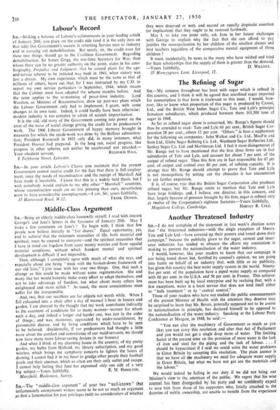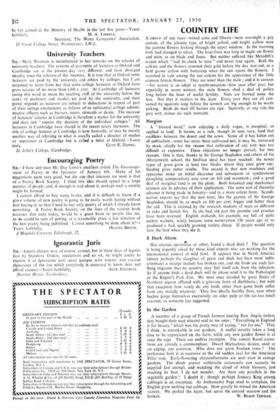Another Threatened Industry
SIR,-1 do not complain of the statement in last week's election notes that "the threatened industries—with-Atte single exception of Messrs. Tate and Lyle Ltd.—have covered up their posters and toned down their campaign," because the publicity given to the sugar, cement and insur- ance industries has tended to obscure the efforts my association is making to prevent the nationalisation of the water industry.
I would, however, like your readers to know that our campaign is not being toned down but, fortified by counsel's opinion, we are going into battle on behalf of an industry that, with little or no publicity, has given this country the best water supply system in the world. Ninety- five per cent. of the population have a piped water supply as compared with 60 per cent, in the U.S.A. and 50 per cent. in France. This achieve- ment has been built up by local enterprise and by realising that, with a few exceptions, water is a local service that does not lend itself either to "bulk treatment" or to "central control."
Those of your readers who have not studied the public announcements of the present Minister of Health with the attention they deserve may be surprised to learn that Mr. Bevan, generally supposed not to be averse to nationalisation in principle, has declared himself to be opposed to the nationalisation of the water industry. Speaking at the Labour Party Conference at Margate, in 1948, he said:— " You can alter the machinery of Government as much as you like; you can carry this resolution and alter that Act of Parliament and you would not get a single drop more of water. The limiting factor at the present time on the provision of more water is the lack
of iron and steel for the piping and the lack of tabour. . 1 should be hypocritical if I said we could solve the water problems in Great Britain by accepting this resolution. The plain answer is that we have all tlie machinery we need for adequate water supply in Great Britain, but what we have not got are the materials and the labour."
We would indeed be failing in our duty if we did not bring our Minister's view to the attention of the public. We regret that his wise counsel has been disregarded by his party and we confidently expect to save him from those of his supporters who, fatally attached to the doctrine of public ownership, are unable to benefit from the experience
he has gained at the Ministry of Health in the last five years.—Yours Secretary, The Water Companies' Association. 15 Great College Street, Westminster, S. W.1.











































 Previous page
Previous page